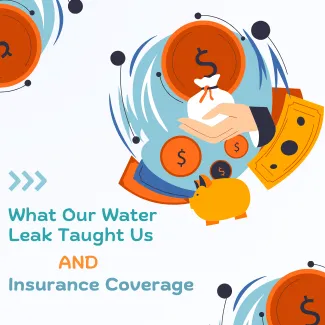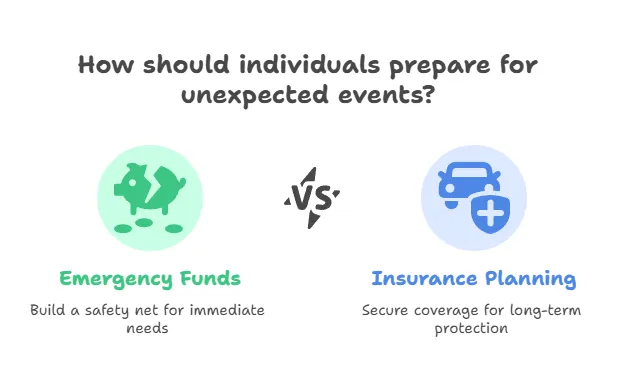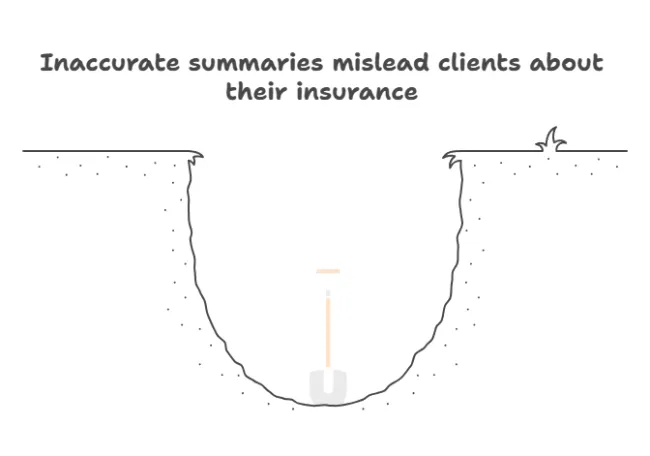
What Our Water Leak Taught Us About Insurance Coverage (And What Yours Might Not Cover Either)
The Day Everything Went Sideways
It was Memorial Day weekend. The sun was shining, the weather was perfect, and we had just arrived at our family’s lake house to get everything ready before some friends came up to join us.
As I walked up to the front door, I noticed something strange—a puddle of water near the entryway.
That’s odd, I thought. It hasn’t rained.
I opened the door and immediately saw a lamp on the ground. Then I looked up.
The sheetrock was gone, and the now three-bladed ceiling fan looked like a dying flower that had been in a fight with a heavy weight boxer.
It took a few seconds for my brain to process what I was seeing.
“Honey… I think we have a problem.”
Now to be fair—I’m the one who screams at bugs, so my husband thought I was overreacting again. He figured it was a spider. Maybe a mouse. Definitely something small and squishable.
But what we found was far worse.
It was raining inside the house.
Water was pouring from the ceiling. Two inches of water covered the tile floors. The furniture was soaked. Sheetrock was everywhere.
As I stepped inside—still wearing my open-toed Birkenstock-style sandals—I could feel the water slosh into my shoes. My feet nearly slipped out from under me.
And that’s when I found the missing ceiling:
I stepped right into a soggy pile of sheetrock.
Then the real weight of it hit.
My daughters were crying.
My husband was trying to stay calm.
I was in sensory and emotional overload.
The sound of dripping water.
The chaos.
The heartbreak of seeing a home you love—ruined.
I needed a moment.
So I walked upstairs, into the bathroom, trying to find space to think. I placed my hand gently on the wall…
And my entire arm almost went through it.
The sheetrock was soaked clear through.
I hadn’t found my sanity—but I had found the source of the water.
A pipe had burst behind the upstairs shower.
We Thought We Were Covered. We Weren’t.
We Thought We Were Covered. We Weren’t.
As a Certified Financial Planner™, I spend my life helping people prepare for the worst. I teach clients how to build emergency funds, manage risk, and make sure their insurance actually protects what they’ve worked so hard to build.
And yet—standing in that flooded house, soaked to the ankles and still trying to make sense of what I was seeing—I wasn’t thinking about exclusions or policies.
I felt overwhelmed.
Helpless.
But oddly enough… relieved.
Because we had insurance.
We had homeowners coverage.
We had an emergency fund.
We had done everything responsible people are supposed to do.
So yes, I was panicked—but there was a small voice inside me saying,
"It’s going to be okay. This is why you pay your premiums. They’ve got this."
Until they didn’t.
What hit harder than the damage was the moment we sat with the adjuster and heard him say—with a calm, almost cheerful smile—that we weren’t covered.
It was like I was reading his lips in slow motion.
“Unfortunately, this type of water damage isn’t covered under your current policy.”
That sentence landed like a second flood—this time in my stomach.
That’s when the shame came.
Not because of the leak.
Not because of the mess.
But because we weren’t actually protected.
And worse—we had no idea.
We were on the hook for nearly everything.
And I was the one who should have known better.
Reading the Fine Print: The Declaration Page Lie
If you’ve never read your insurance policy beyond the first couple of pages, you’re not alone.
Most people rely on the declaration page—a summary of coverages, limits, and deductibles—to feel confident. I’ve done it too. In fact, as a financial planner, I ask every single client for their declaration pages during our planning process.
Because it gives me the big picture.
Or so I thought.
According to our declaration page, we were golden.
According to the exclusions buried in the policy… not so much.
The declaration page told us we had coverage.
The fine print told us we didn’t.
Insurance Illusions: What You Think Is Covered… Probably Isn’t
Here’s the truth no one wants to say out loud:
Most people are insured… but not actually protected.
They think they’re covered because they have a policy.
They saw the words “comprehensive,” “full coverage,” or “guaranteed.”
But like me, they never took the time to read the exclusions. The conditions. The legal disclaimers are designed to confuse more than clarify.
Let’s walk through the realities of what your policies may not cover — no matter how insured you feel:
Homeowners Insurance
Most homeowners assume “if it breaks, it’s covered.”
Here’s what actually gets denied all the time:
- Gradual water leaks (not “sudden and accidental”)
- Mold remediation
- Foundation cracks or settling
- Sewer or drain backups
- Flooding from outside (requires separate flood insurance)
According to our declaration page, we were golden.
According to the exclusions section, we were soaked and unsupported.
Auto Insurance
You’ve got “full coverage,” right? Well…
- Rental car coverage isn’t automatic — check for loss-of-use protection
- Aftermarket upgrades (custom rims, lifted suspension) are often excluded
- You may be underinsured for uninsured motorists, which is ironic at best
Health Insurance
Even with a “good” plan, surprise bills can wreck your budget:
- Emergency care from out-of-network hospitals
- Mental health services with pre-authorization delays
- Expensive prescriptions in higher copay tiers
Pro tip: Ask your carrier for your formulary list and review tier levels every year.
Life Insurance
The biggest “I’ve got this covered” lie we tell ourselves:
- Suicide clause (often voids policy within first 2 years)
- Exclusions for dangerous hobbies (like skydiving or scuba diving)
- Group life policies through your job — which don’t follow you when you leave
And yes, trying to ride a bull named Sparkles—conveniently renamed from Widowmaker—for 8 seconds probably counts too.
Umbrella Insurance
This is often misunderstood as “catch-all protection.” But in reality:
- It only kicks in after your home or auto policies are maxed out
- It doesn’t cover business activities, intentional acts, or malpractice
- Many people have umbrella insurance but haven’t adjusted the coverage in years
If it’s been more than 2 years since you reviewed your umbrella limits, it’s time.
Why I Ask for Every Client’s Declaration Pages
After that experience, I made a promise to myself—and to every client I work with going forward:
- We don’t skip the insurance basic review.
- We don’t assume anything.
- And we never, ever trust a summary page at face value.
The declaration page is where most people stop.
It’s clean, it’s straightforward, and it gives you a sense of what’s included: your coverage amounts, deductibles, and listed protections.
But here’s the problem:
The declaration page tells you what’s covered.
It doesn’t tell you what’s excluded.
And that’s where most of the financial pain lives.
In my case, the dec page made it look like we were fully protected.
But buried deep in the exclusions—pages in, under an obscure clause—was a single sentence that made all the difference.
It was the line that meant:
“No, we’re not paying for that.”
And here’s what I know now:
The odds of something like a catastrophic water leak seem low… until they’re not.
One day it’s just another item on your to-do list. The next day, you’re ankle-deep in water wondering what happens now—and praying your policy says the right thing.
That’s why, as a financial planner, I now require clients to send in all of their declaration pages when we do a comprehensive plan—including:
- Homeowners and renters insurance
- Auto insurance
- Health insurance
- Life insurance
- Disability and long-term care
- Umbrella policies
We dig in. We cross-check it.
And most importantly—we look for what’s missing.
Because it’s not enough to know what’s “covered.”
You need to know what’s not—before life hands you the kind of disaster that makes you find out the hard way.
Insurance Is a Financial Planning Tool (Not Just a Policy)
Most people think of insurance the same way they think of seatbelts or fire extinguishers:
You buy it.
You hope you never use it.
You forget about it—until something goes wrong.
But here’s the thing:
Insurance isn’t just protection. It’s a financial planning tool.
And like any tool, it’s only useful when:
- You choose the right one
- You know how to use it
- You check it regularly to make sure it still works
Too many people treat insurance like a static line item on their budget:
“Home, auto, health… check.”
But what’s missing in most financial plans isn’t coverage.
It’s clarity.
Clarity about what’s covered.
Clarity about what’s excluded.
Clarity about whether your current policies match your current life.
Because if your insurance hasn’t changed in 5 years—but your life has—you may not be protected in the ways that matter most.
That’s why I don’t treat insurance like a side conversation.
It’s part of the financial foundation.
It sits right alongside your retirement strategy, your estate plan, your investment mix, and your goals for the future.
You can’t build lasting wealth without first protecting what you’ve already built. Learn What Homeowners Insurance Doesn't Cover.
That includes your home.
Your income.
Your family.
And yes—your peace of mind.
Self-Insurance: What It Is, and Why You Better Plan for It
Here’s the truth:
In the end, we were covered—just not in the way we thought.
We were forced to self-insure.
That means the money didn’t come from an insurance company.
It came from us. From our savings. From our emergency fund.
From the financial margin we had built over time.
And while we were fortunate enough to absorb the cost without going into debt, it still hurt. Learn : Do You Really Need Life Insurance?
Because self-insurance only works if you’ve planned for it.
If you haven’t built the reserves, the liquidity, or the cash flow to back it up, then you're not self-insured—you’re just exposed. Read How to Plan for a Comfortable Retirement.
And here’s the thing most people don’t realize:
The difference between a minor inconvenience and a financial catastrophe isn’t always the size of the event.
It’s the quality of your policy—and whether you knew what was coming.
A $15,000 water leak might be annoying if you’re ready for it.
But if you’re not? It could derail your emergency fund, delay your retirement, or force you to make trade-offs you weren’t ready for.
Which is why understanding your home insurance—not just having it—is so critical. Learn Life Insurance 101: How Much Do You Really Need?
Not because you expect the worst.
But because you’re financially mature enough to plan for it anyway.
What You Can Do Right Now
If there’s one thing I learned from this experience, it’s this:
Insurance is not the place to make assumptions.
You can have coverage and still be financially exposed.
You can have a policy and still end up paying out of pocket.
You can do everything “right” and still feel blindsided—unless you dig deeper.
So here’s what I recommend to every client, and what I’m recommending to you right now:
1. Pull out your insurance policies—yes, all of them.
Homeowners, auto, health, life, disability, umbrella. You don’t need to read the legal jargon cover to cover (yet), but you do need to find your declaration pages.
2. Look past the numbers.
Don’t just check your coverage limits. Look for the exclusions, the conditions, and the fine print that determines what actually triggers a payout.
3. Ask yourself: “Am I truly protected?”
If the worst-case scenario happened today—a fire, a wreck, a diagnosis, a lawsuit—would your policy respond the way you think it would?
4. Consider whether you’re unintentionally self-insured.
If you’re counting on insurance to protect you, but the coverage doesn’t match the risk, you’re not covered. You’re self-insured. And unless you’ve built a financial plan that supports that, you could be putting your retirement, your home, or your family at risk.
5. Work with a planner who actually looks at your insurance.
This isn’t a box to check. It’s a conversation that needs to happen with someone who knows how to read between the lines—and advocate for your future.
If you’re ready to make sure your financial plan is truly protected—
Not just with numbers, but with real coverage and clarity—
I’d love to help.
Let’s talk about your plan and your policies
Schedule Your Review Today
Or download your Free Insurance Audit Guide to start reviewing your policies like a pro.
FAQs about insurance coverage
Q: What is a declaration page, and why is it important?
A declaration page is a summary of your insurance coverage, listing your policy limits, deductibles, and basic protections. But it does not include the exclusions, conditions, or fine print — and those are often what determine whether or not a claim gets paid.
Q: How do I know if I’m “self-insured”?
You’re self-insured if you’re financially responsible for covering risks your policy excludes — whether or not you’re aware of it. If your insurance doesn’t fully cover a potential event and you haven’t built a financial cushion to absorb it, you’re exposed.
Q: How often should I review my insurance policies?
At a minimum, review your policies every 1–2 years or anytime your life changes significantly (new home, new job, new baby, etc.). Policies should grow with your life, not lag behind it.
Q: Can a financial planner really help with insurance?
Yes — a comprehensive financial planner doesn’t just focus on investments. They help protect the entire financial plan, and that includes reviewing your coverage, reading the exclusions, and spotting the gaps before something happens.





